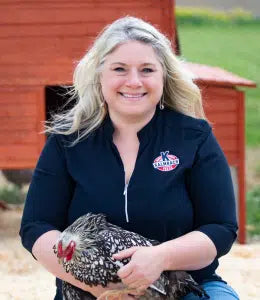What to Feed Chickens in Winter: Key Considerations for Your Flock

As the temperatures drop, it’s essential to look at your chickens’ diet and adjust it to support your feathered friends’ health and well-being this winter. Cold weather brings additional challenges for chickens, especially laying hens, as your birds work hard to stay warm. Giving chickens the proper nutrition during the colder months can help your chickens stay healthy and continue laying. Let’s dive into what you need to consider when feeding chickens in wintertime, including how to make sure they get the right balance of nutrients.
What to Consider Before Changing Your Chicken Feed in the Winter
Before changing your chickens’ feed this winter, be sure to consider a few factors:
- Your flock’s overall health
- Your breed or breeds of chickens
- Environmental factors like temperature, snow, wind, etc
During wintertime, your fluffy chickens use much more energy to keep their naturally high internal temperature up to maintain steady body heat. Nutritionally speaking, your chickens need more fuel for their internal furnace to stay healthy and keep up egg production. A balanced winter diet ensures that they remain healthy, active, and productive.
- What is Calcium’s Role in Chicken Bone Development?
Calcium is critical for chickens, especially laying hens, as it supports bone health and eggshell formation. Hens can suffer from bone fractures, osteoporosis, and reduced egg production without sufficient calcium. Hens prioritize using calcium for eggs, often at their own cost, making calcium supplementation vital during winter months. Calcium deficiencies can lead to weak eggshells or even stop egg production.
Supplementing calcium is vital, but it is essential to provide the right amount. Over-supplementation, especially for non-laying hens or roosters, can lead to kidney damage since these chickens have a lower need for calcium.
- Should I Keep My Hens on a Layer Feed All Winter?
Maintaining your hens on a quality layer feed throughout the winter is helpful. Layer feed is designed with the proper calcium and protein levels to support egg production and skeletal health. If your hens are still laying in winter, they will need the consistent supply of nutrients found in layer feed.
- When Should I Switch Away From a Layer Feed in the Winter?
In some cases, switching from a layer feed may be appropriate, particularly for non-laying hens or roosters. For these birds, a maintenance feed with a lower calcium content will prevent calcium overload, which can harm their kidneys. If your hens have reduced their egg laying significantly due to less sunlight and shorter days, consider balancing calcium intake with maintenance feeds.
- How Can I Keep My Chickens Laying All Winter?
Support regular egg production during winter by ensuring your hens receive plenty of sunlight. Hens require 14-16 hours of light daily to maintain consistent egg production. You may want to consider supplementing the light in their coop in addition to maintaining proper nutrition. Extra protein and high-quality feed are helpful during the winter to give your chickens the nutritional resources they need to stay warm and lay delicious eggs.
Winter Chicken Feed Nutritional Needs
- The Feathered Furnace
Chickens naturally generate heat to keep themselves warm in cold temperatures, often called their “feathered furnace.” Feathers trap warm air close to their bodies, and their metabolism works harder in winter, which increases their energy needs. Ensuring your chickens have the proper nutrition will help them maintain body heat efficiently.
A winter diet should include more calories, which can be achieved by providing feed with a higher energy content. Grains like corn are excellent for this purpose as they are easily digested and provide a quick energy source.
- Do Extra Calories Equal Extra Comfort?
While extra calories are essential, they must be balanced with other nutrients. Increased caloric intake without proper vitamins and minerals can lead to an unhealthy flock. A rounded diet, rich in protein and fat, supports energy needs and egg production. Foods like sunflower seeds or mealworms provide healthy fats and proteins to keep chickens strong throughout the winter.
- Water is Still Important in Winter
Water remains crucial to your chickens’ diet, even in freezing conditions. Without access to fresh water, chickens can become dehydrated, which affects their ability to maintain a regular body temperature and produce eggs. In winter, water can freeze quickly, so make sure it stays thawed by using heated waterers or regularly replacing ice with fresh water.
If your chickens’ water is too cold, they may avoid drinking it, increasing their risk of dehydration. Keeping waterers clean and in a sheltered area can also prevent bacteria growth, maintaining the overall health of your flock.
- Finding the Best Winter Chicken Feed for Your Flock
Choosing the suitable winter chicken feed depends on your flock’s specific needs. Like those offered by Kalmbach Feeds, a high-quality commercial feed provides a balanced diet rich in essential nutrients. Look for feeds with higher protein, fat, and calories to support your flock during the colder months.
Additionally, supplementing their diet with treats like cracked corn, oats, or scratch grains can provide extra energy for warmth. Still, these should be given in moderation to avoid disrupting their nutritional balance.
Winter feeding is about meeting the increased energy demands while maintaining a balanced diet to support egg production, bone health, and overall well-being. By providing the right feed, adequate light, and access to water, you can keep your flock healthy and able to lay through the colder months.
